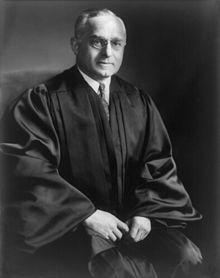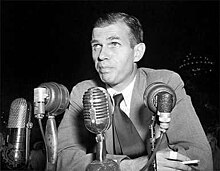|
Nathan Greene (lawyer)
Nathan Greene, also known as "Nuddy" Greene (ca. 1902–1964), was an American lawyer and legal scholar. He cofounded the International Juridical Association and cowrote The Labor Injunction with his professor and future Supreme Court Justice Felix Frankfurter. The book criticized the U.S. Supreme Court for creating "government by injunction".[1][2][3] BackgroundNathan Greene was born in Brooklyn, New York, circa 1902. He attended City College of New York and then graduated with an LLB jurisprudence in 1925 from Harvard Law, where he was a "Frankfurter favorite."[1][2][3][4] Career In 1930, Greene co-authored the book Labor Injunction with Frankfurter, well received at the time as "at once scholarly and interesting... Mechanically the book is perfect" and also "comprehensive."[4][5][6] PracticeAccording to The New York Times (but without specifying when, for whom, or in what capacity), Greene "advised many members of the New Deal Administration on labor legislation."[1] In the 1930s, Greene became a partner in the New York law firm of Cook, Nathan & Lehman (also known as "Lehman & Greenman"–Lehman was the brother of New York state governor Herbert Lehman[2]). He worked there until the 1940s.[1][4] While there, Greene became mentor to Joseph Flom, later a partner in Skadden, Arps, Slate, Meagher & Flom.[7] (Louis M. Loeb was a prominent partner in that period.) In the 1950s, he served as special counsel to Lazard Freres & Co. and joined the Development and Resources Corporation or "D&R," founded in 1955 by David E. Lilienthal. (Lilienthal, leader of the Tennessee Valley Authority or "TVA," also worked for Lazard Freres and then formed D&R as an engineering and consulting firm which shared some TVA objectives, i.e., in supporting major public power and public works projects for overseas clients, including: Iran, Colombia, Ghana, India, Italy, Morocco, Nigeria, South Vietnam, and Venezuela.)[1] International Juridical Association (IJA) By 1932, Greene had become a member of the International Juridical Association (IJA), whose members included: Carol Weiss King, Osmond Fraenkel (ACLU), Joseph Brodsky (lawyer) (ILD), Roy Wilkins (NAACP), Paul Frederick Brissenden, Jerome Frank, Karl Llewelyn, Charles Erskine Scott Wood, Floyd Dell, Yetta Land, Shad Polier, Thomas Emerson, Alger Hiss, Nathan Witt, Lee Pressman, Abe Fortas, and Joseph Kovner. Of King, Greene said:
With Joseph Kovner, he edited issues of the International Juridical Association Bulletin. Through the IJA, he came to know prominent Communist union officials, including Ben Gold and Irving Potash. He helped them prepare for legal cases, and then he wrote about those cases in the IJA Bulletin.[1][2][8][9] Of the Bulletin, Greene commented said that the editor tried "to understand the day-by-day and month-by-month movements in freedom's ride and to convey this understanding to others."[2] In 1937, with other IJA members, Greene helped write an amici curiae on behalf picketers, whom the U.S. Supreme Court had bared during Senn v. Tile Layers Protective Union.[2] In 1938, unlike many other IJA members, Greene refused to help fund a habeas appeal for Johnson v. Zerbst, 304 U.S. 458.[2] In 1939, Greene helped draft a statement for King in her defense in Re Harry Bridges.[2] In 1940, Greene made a speech (soon published as "Civil Liberties and the NLRB) at an IJA annual fundraiser dinner in New York City, in which he stated:
In the speech, Greene also criticized the ACLU, which "hoped that on a level playing field, workers' private collective strength could effectively counter the power of capital. Its onetime allies [i.e., including the IJA] reminded it, unavailingly, that background inequalities made its vision fanciful – that employer speech was "a protected commodity in a monopoly market."[10][11] In 1945, King had Greene write the brief for Bridges v. Wixon. "In essence, the King-Greene case theor argued that a denial of due process occurred because the government had already litigated the case (via the Landis decision), thereby resulting in a form of double jeopardy. In addition, the law due process was violated since Congress had passed the law under which he was prosecuted after Bridges' earlier legal victories.[3] Personal lifeGreene married Rosalinda Fleming and had one daughter. He died on October 30, 1964, at St. Vincent's Hospital Manhattan in New York City, aged 62.[1] WorksIn 1930, Greene co-authored The Labor Injunction with Frankfurther while he was still at Harvard. The book provides "an excellent treatment of the reasons underlying the anti-injunction laws."[2][12] The article was "a learned and effective plea against the use of injunctions to curb the self-help methods of organized labor and in favor of the then pending Norris-LaGuardia Act."[13] Rather than withhold withhold from remedy for the wrongs, Greene and Frankfurter argued as follows:
In their 1931 article "Congressional Power Over the Labor Injunction," Greene and Frankfurter wrote:
With Felix Frankfurter:
By himself:
Articles: See also
References
External sources
|
||||||||||||||||||||||
Portal di Ensiklopedia Dunia